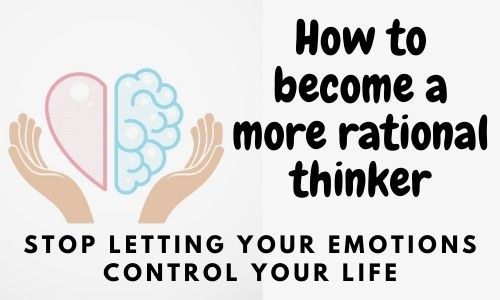Stop letting your emotions control your life
Are you a rational thinker who considers all the facts before making decisions? Do you think about consequences before taking action?
Or are you an emotional thinker who lets emotion cloud their judgement, impulsively bases their decisions on gut feelings and doesn’t worry about the fallout?
Maybe you’re a little of both. Your rational thinking self considers the facts and weighs the consequences, but your emotional thinking self might make spontaneous decisions because it feels good at the time.
“I’m selfish, impatient and a little insecure. I make mistakes, I am out of control and at times hard to handle. But if you can’t handle me at my worst, then you sure as hell don’t deserve me at my best.”
We’ve all seen this quote, attributed to Marilyn Monroe (but not verified). While it can be seen as an empowering quote because we all deserve love and respect despite our flaws, it also minimizes the impact of our unhealthy or dysfunctional emotional decisions and behaviors on our relationships.
Emotions are powerful. Negative emotions warn us of threats or challenges, while positive emotions build resilience and awareness. It’s never a good idea to ignore your emotions completely. On the other hand, letting your emotions run wild and inflicting your inner turmoil on those around you is a formula for disaster.
I know this because I have been there. I was the type who bottled up all those emotions until they exploded. It never went well.
As an Amazon Associate I earn from qualifying purchases. This means if you click on a link and buy something I’ve recommended, I get a small commission at no additional cost to you. You can see my full Disclosure Policy here.
What is emotional development?
Our emotional development begins when we are born and continues until the day we die. From simply crying from hunger as a baby to more effectively managing our emotions as an adult, we are constantly evolving and adapting our responses to our emotions.

Childhood trauma and stress can make us hypervigilant, looking for signs that an upsetting event that happened in the past might repeat itself. Even if your childhood was idyllic, your parents likely weren’t perfect and some distressing events happened while you were growing up.
We all have some kind of emotional baggage. Everyone experiences some type of childhood pain that shapes the way we see and interact with the world. Our emotions guide our thoughts, intentions and actions. Sometimes, the emotions we felt in our childhood can creep in when we feel vulnerable or threatened, leading to us allow our emotions to cloud our judgement.
What is an emotional thinker?
An emotional thinker is generally less able to distinguish between emotions and thoughts. They frequently base their decisions on their emotions and take action accordingly. Emotional decision making is usually made quickly and is based on instinct, impulse, and intuition.
Emotional thinkers tend to let their feelings rule them, regardless of the facts of the situation. If they’re feeling a certain emotion, such as anger, that anger affects the way they perceive reality. That’s how they feel and their feelings are to be treated as facts.

To those around them, this emotional reaction may seem overblown compared to the situation they are in. They can appear unreasonable or irrational, leaving those around them confused and uncertain how to respond to resolve the situation. This can negatively impact relationships.
But feelings aren’t facts.
How do emotions affect behavior?
Behavior is what we do and how we act. Our emotions directly influence our behavior, decision making, creativity and interpersonal relationships.
Happiness is an emotion that includes feelings of well-being, contentment, joy, and satisfaction. A happy person usually has a smile on their face, they are relaxed, upbeat and pleasant to be around.
When a person is scared, angry or frustrated, they may act aggressively. Think about that car that cut you off in traffic. Did you yell at them and let it go? Emotional thinkers might make an impulsive emotional decision to cut the car off or even brake check them.
Emotions also affect motivation which, in turn, affects behaviour. It doesn’t take much for emotional thinkers to get overwhelmed and feel helpless and frustrated. The feelings seem insurmountable, leaving no energy to take action and get things done. So they distract themselves and do nothing to move the issue forward. This is one of the primary causes of procrastination.
Our thoughts and emotions drive our behavior. Becoming more aware of those thoughts and emotions can help us better manage our reactions and positively influence our behavior.
What is a rational thinker?
A rational thinker relies on facts and considers the variables of a situation before coming to a conclusion. They use past experience and facts, and research relevant information and data to determine their decisions and actions. They have an internal process they use to weigh the variables before making a decision and taking action. This takes time – rational thinkers rarely come to quick decisions.
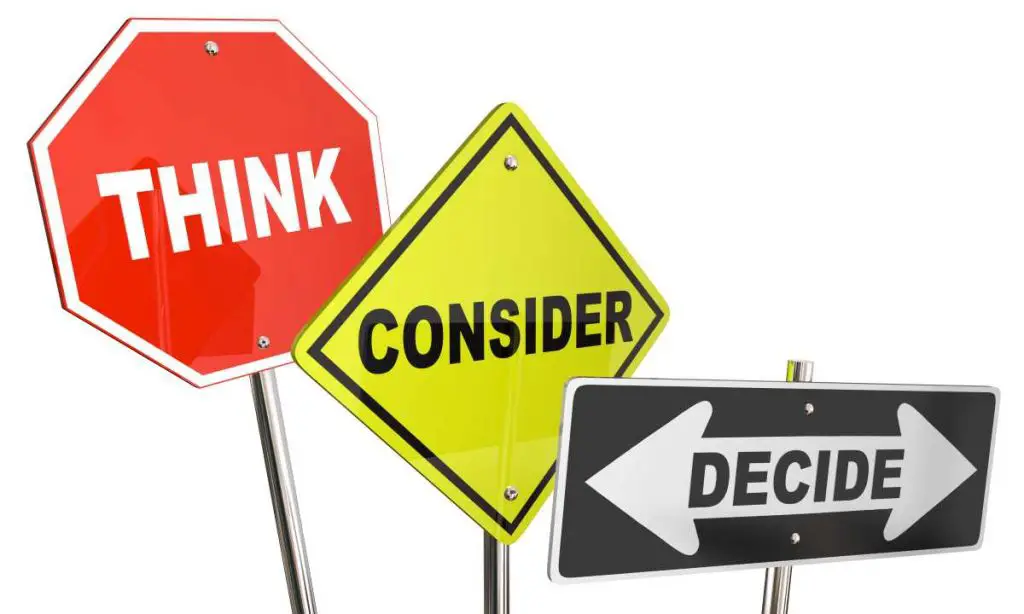
Unlike emotional decision makers, rational thinkers don’t let emotions cloud their thinking. They are able to push those emotions to the side and base their judgments on reliable information, regardless of how it makes them feel.
Rational thinkers also consider all of the consequences of their decisions before making them. They weigh all the pros and cons and keep the final goal in mind. If they’re unsure about something, they will do the research required to back up their decisions. Google is the rational thinker’s best friend.
Can emotions be rational?
We are emotional beings and those emotions serve as essential guides for our choices. They help ensure our own well-being and influence our decisions to help us determine the best way to proceed.
For example, fear can be considered a rational emotion when it’s a reaction to real danger that threatens your safety. Fear will compel you to protect yourself and those you love. In most cases, there is little to no time for rational thought when faced with a life or death situation, resulting in a purely emotional decision.
Emotions can be rational or irrational. If the emotion fits the reality of the situation, it is rational. If the emotion you’re feeling doesn’t reflect the actuality of the circumstances, it is considered irrational.
How do emotions affect rational thinking?
Emotions are triggered by your brain interpreting situations based on your past experiences, thoughts and beliefs. This influences how you feel and behave. Most of your decisions are influenced by this process in some way.
When an emotion is triggered by a past event that doesn’t reflect your current situation, you could react in an irrational manner. These strong emotions may cause your brain to bypass your rational thinking mind and lead your emotional thinking mind to make unwise decisions.
Different emotions affect decisions in different ways. Emotions can also affect not just the decision itself, but also the speed at which you make it. Instinct plays a huge part in our decision-making process, but it could sway you the wrong way and might lead to unwanted outcomes when you fail to consider the implications.
Is it better to make decisions based on emotional or rational thinking?
Most decisions involve both emotional thinking and rational thinking. You may know that a certain outcome may not be as favorable as you’d like, but you’re so excited about doing it that you make the emotional decision to do it anyway. For example, taking that dream vacation even though it could negatively impact your savings. (I do this too often because I LOVE the ocean, but I live nowhere near one.)

Emotional decision making can also make our decisions more personal and meaningful. What’s good for one person is not necessarily good for another. We all have our own strengths and weaknesses, needs and goals. The best decisions we make for ourselves are those we make based on rational thinking in combination with emotional thinking.
For example, you could be longing to buy your own house and you know it would be a great investment in your future, but you have no handyman skills to keep it maintained. The fear of having to deal with repairs could keep you from making what could otherwise be a good decision. So you continue renting and find other ways to invest – the best decision for you.
What is emotion management?
Emotion management is the ability to effectively respond to an emotional experience. This involves feeling, identifying, and managing our emotional reactions appropriately to fit a given situation.
Emotion management skills can help enhance many facets of our lives. These skills can enrich personal relationships, improve our performance at work, and even lead to better overall health and well-being.
Managing our emotions makes those emotions much less likely to escalate and lead to undesirable situations that we regret. Emotions also affect our moods and, while emotions can come and go quickly, moods can last for days. Emotional management skills can improve our general mood and outlook on life.

Even if you have good emotion management skills, you may still feel uncomfortable or unwanted emotions creep out. At some point in everyone’s life, emotions can spin out of control. It’s what you do with them that counts.
Related post: How to deal with disappointment and sadness
How can you improve your emotion management skills?
Improving your emotion management skills will help you to better recognize and understand your own emotions. By choosing how and when to express the emotions we feel, these skills can help you improve your personal and professional relationships, your overall mood and your general sense of well being.
Take responsibility for your own emotions, actions and behaviour
You – and only you – are responsible for your own emotions, actions, behavior and any consequences you may face. If you lash out at someone to express your emotions, your reaction is your responsibility.
It is not helpful to blame someone else for the way you feel, nor is it helpful to self-righteously defend your reaction. Your actions, reactions and behaviors are your choice.
Identify and accept your emotions
Take a deep breath and stop and think about the emotions you are feeling. Are you feeling jealous, angry, threatened or scared? Or are you feeling anxious, overwhelmed and stressed? It’s important to pinpoint exactly what it is you’re feeling in order to effectively process the emotion.
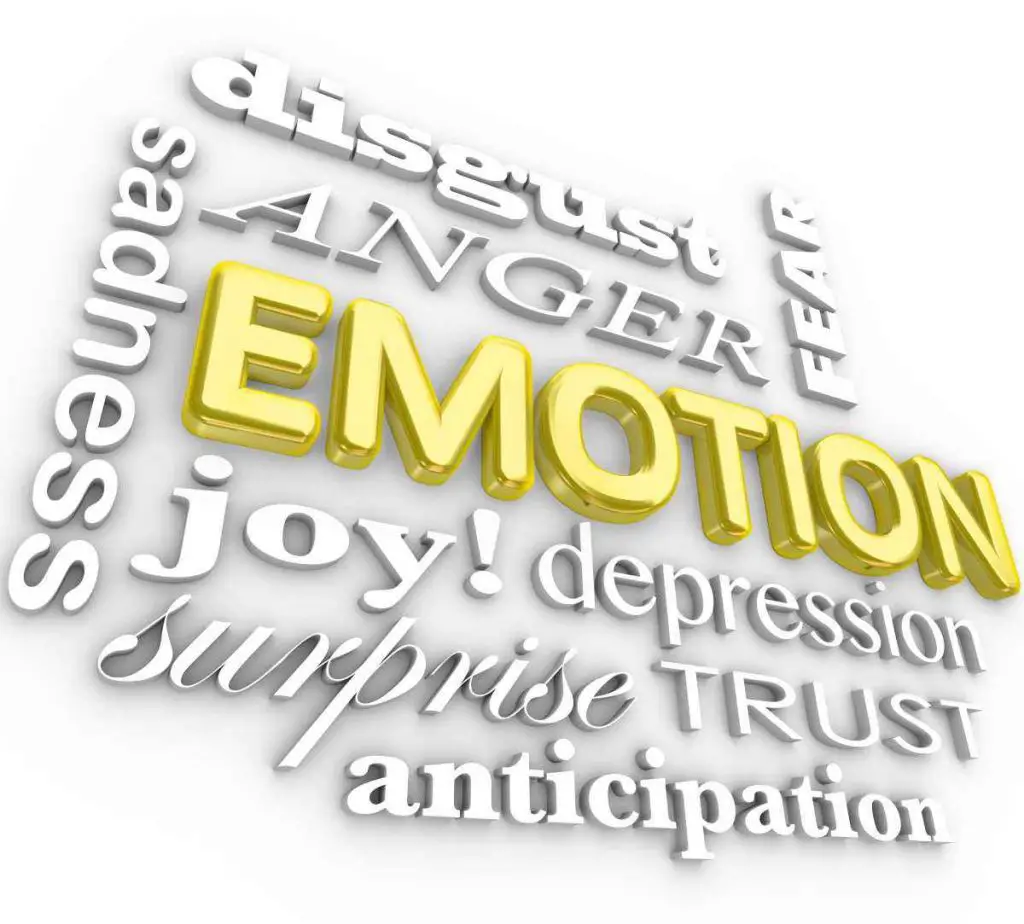
Try not to judge yourself on those feelings. Emotions are not facts. They just are. They can come and go quickly and you may feel many emotions at the same time. They can be mild or they can be intense.
Once you’ve identified the emotions you’re feeling, take another deep breath or two. The act of identifying your emotions in itself can help you feel more in control and allow you to better cope with the situation.
Understand your emotions and where they are coming from
Our past experiences are a significant factor in how we feel in any given situation. Our emotions are linked to our memories, beliefs and thoughts and can trigger an unwanted reaction when we are feeling a specific emotion.
When I was five years old, I was hospitalized for a week after a tonsillectomy due to non-stop bleeding. They kept me isolated in my room as any activity could cause more bleeding, but I didn’t understand that.
The room had a glass window looking into the children’s playroom. All day, I could see the other kids playing in that room, but I wasn’t allowed to go in there and play and I didn’t know why. I felt disappointed, overlooked, lonely and abandoned. Those feelings and thoughts were ingrained in me throughout my childhood and as a young adult.
It wasn’t until many years later, after several regrettable experiences as an adult that I realized this experience had caused me to push people I cared about away. Whenever I felt disappointed, overlooked, lonely or abandoned, those emotions unconsciously linked back to my experience when I was five and my actions and behavior negatively reflected those feelings. I told myself I didn’t need them.

These self-sabotaging thoughts are why it’s important to try to connect your thoughts to the emotion you’re feeling. In recognizing the thoughts, you’re able to address them, accept them and take action to move forward.
Determine if what you’re feeling is appropriate to the circumstances
Another necessary step before you respond is to determine if the emotion(s) you are feeling match the situation you are experiencing. Emotional reactions can actually be quite appropriate if they happen in the right situations.
An appropriate emotional reaction would be if, for example, you were attacked by a dog in your past. When you unexpectedly come across a snarling dog, it is perfectly reasonable to be afraid of the dog so you avoid another attack. Expressing that fear will allow those around you to understand it.
An inappropriate emotional reaction is when your actions and behaviour don’t match the situation that you are in. Bursts of anger, crying, and accusations can confuse those around you and not make sense to them as they have no idea where it’s coming from. This can negatively impact your relationships.
If you quickly jump to conclusions without knowing all the facts, assume you know the intentions of other people, or blame others for how you feel, it is likely that you may display inappropriate emotional reactions to situations that involve conflict or misunderstandings.
It is important to recognize that other people don’t control your emotions. You do.
Consider the consequences
Before taking action, you should also consider the consequences of the actions you may take. You are in charge of your actions and behaviors. Every action has a reaction, and consequences can change our lives in both positive and negative ways.
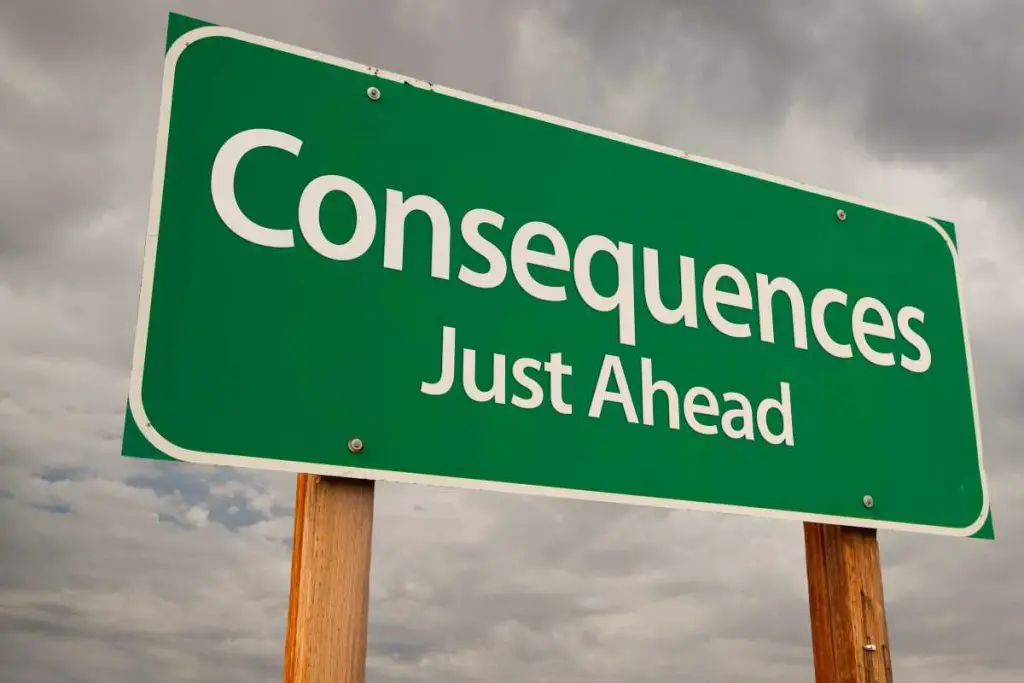
The consequences of our actions can help us grow and evolve. They can also be a valuable learning tool. Think about what your primary goal is in the situation and what actions or behaviors will lead you closer to that ultimate goal.
Taking the time to consider the consequences can help you achieve your goals and avoid regret.
Challenge your negative thoughts
The thoughts that create our problematic emotions are usually negative. Negative thoughts trigger negative emotions. And guess what, those negative thoughts are usually not true!
Do these types of negative thoughts take up too much space in your head?
- She’s avoiding me. She hates me. (personalizing – assuming you are to blame for anything that goes wrong)
- If I don’t get a girlfriend soon, I’ll be single forever. (catastrophizing – assuming the worst possible outcome)
- I will never be successful. (black and white thinking – sees only 2 options – can’t see the shades of grey in between)
- Why does my boss want to talk to me? I must be getting fired. (filter thinking – only thinks of the negative side)
Can you see how these negative thoughts can lead to inappropriate emotional reactions? Stop and evaluate whether these thoughts are accurate. If you question and challenge these thoughts, it can help you to reframe them in a more positive way.
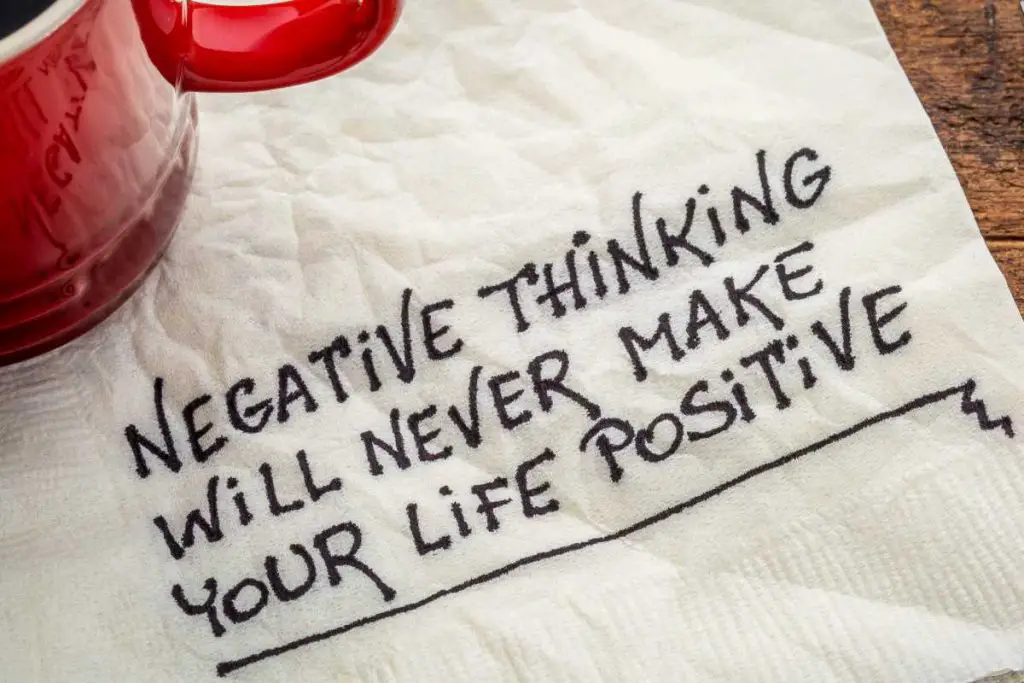
What would you say to a friend if they made any of these statements? You would probably offer them many reasons why the things they are saying about themselves are not true. Be that kind and gentle friend to yourself and focus on your positive attributes.
You could also allow yourself to imagine the worst thing that could happen. How would you cope with that worst-case scenario? Will it matter a month from now or a year from now? If you’ve already thought this through, you may be pleasantly surprised when things go more smoothly than you imagined.
Is the way you’re thinking helping you to achieve your goals? Is it helping you get the most out of your life or is it standing in your way? Thinking about what you want to achieve instead of focusing on the past is an effective tool to build fortitude and resilience and move forward.
Change your reaction
Sometimes the best way to respond to an emotion is by not responding at all. Not all emotions necessarily have to mean something. Additionally, if what you’re feeling is appropriate to the situation, there’s no reason to change your response.
It’s best to try to avoid emotionally charged situations that are known triggers of unwelcome emotions. If at all possible, change your schedule if rush-hour traffic provokes you or make your appointments first thing in the morning if waiting makes you fume. My route to work involves the least number of traffic lights because too many red lights in a row frustrate me.

If you can’t avoid emotional situations, you need to develop strategies to help you calm down. Take a time out. Start with deep breathing. If you can, move your body to help dispel the anger, anxiety or whatever negative emotion you are feeling. Run up and down some flights of stairs or take a walk outside.
Take the time to identify your emotions and understand where they are coming from so you can make a more rational decision on how to proceed.
You might want to try meditation if these suggestions don’t work for you and you’re still having difficulty managing your emotions. Meditation has proven benefits including better focus and concentration, improved self-awareness and self-esteem, and lower levels of stress and anxiety.
Related Post: How to stop feeling overwhelmed with life
How do you balance logic and emotions?
While our emotional thinking self is dominant over our rational thinking self (about 80%), the good news is that you don’t have to let our emotions rule you. Emotion management skills, along with maturity and life experience can help you bring the two into balance.
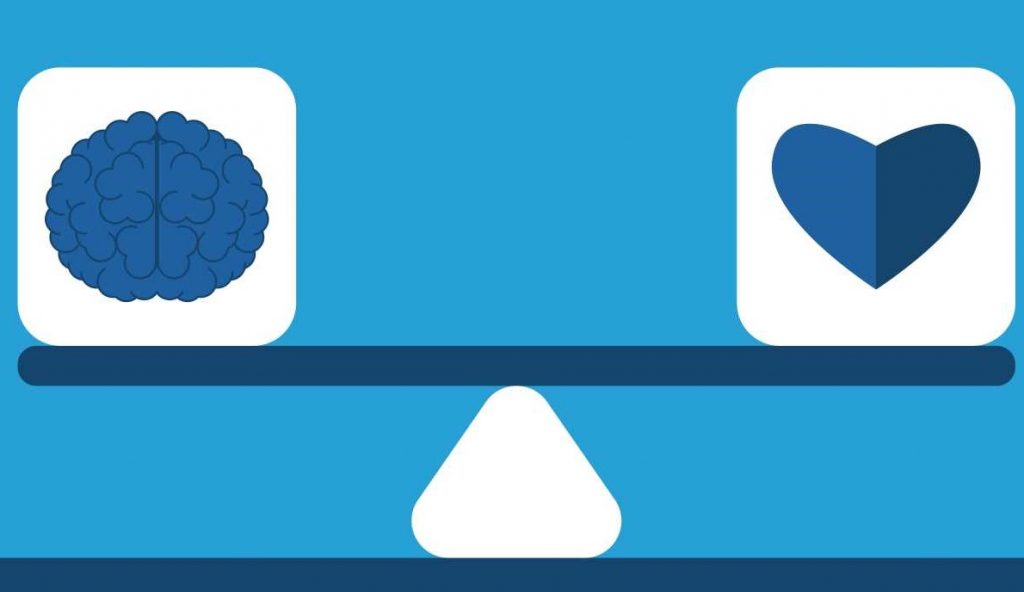
Try not to make any important decisions when you are hungry, angry, lonely or tired (HALT). These feelings will leave you much more susceptible to making an emotional decision, even if it is the wrong one.
When faced with a decision, it’s important to slow down and consider all the variables of the situation including pros, cons, risks and potential consequences. Gather all data and information available to you that is relevant to your decision.
It’s also important to consider how each choice makes you feel. If a particular choice scores high in your logical assessment but leaves you feeling cold, it probably isn’t the right choice for you. If a particular course of action also scores high in your assessment and induces positive emotions, then it’s more likely a good choice.
Both emotional and rational thinking have a role to play in helping us make positive decisions. If you treat your emotions logically, and your logic emotionally, you can more easily balance between what is logically the right thing to do and what you want to do.
How can I improve my rational thinking?
Being a rational thinker is an important skill that helps you to attain your goals, desires and dreams. These simple steps can help you make more rational decisions.
Take your time
Big decisions should not be made on an impulse. Taking your time to make decisions gives you a chance to gather more information, consider the variables and make smart choices.
Make a list
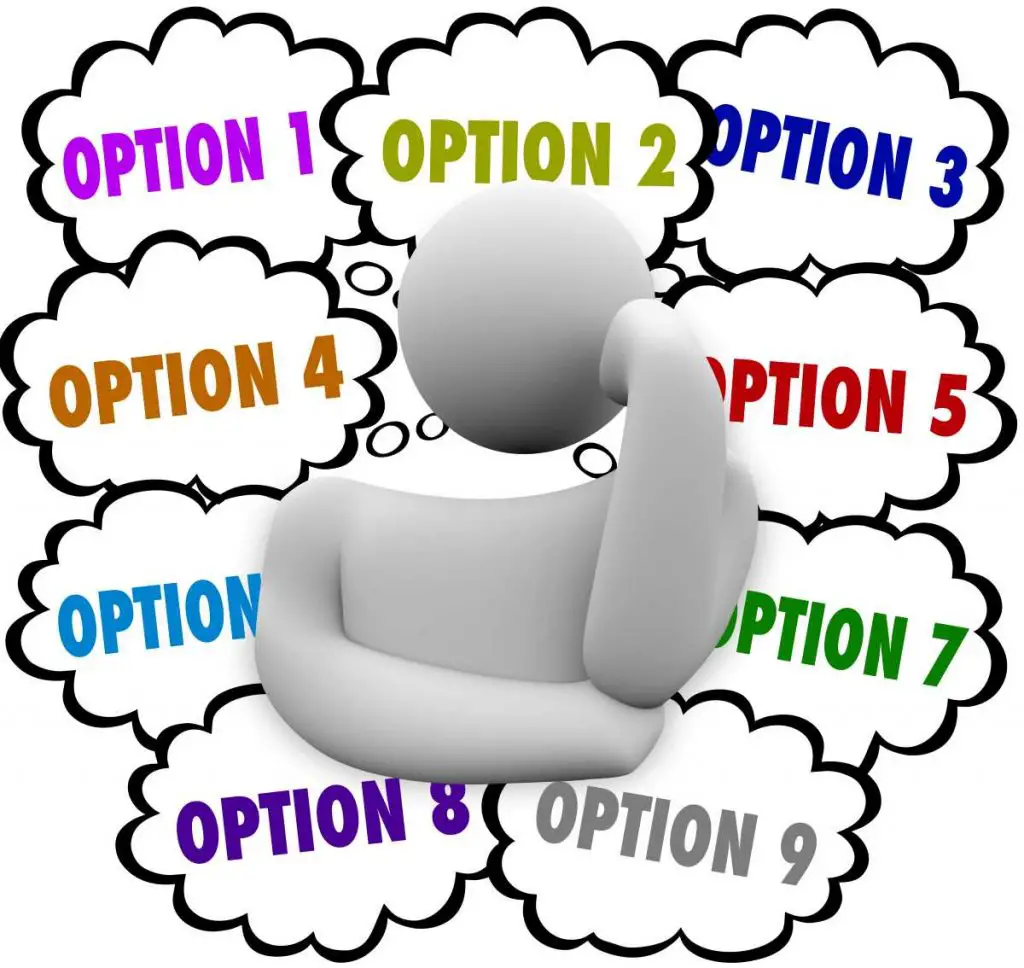
It can be helpful to make a list of your choices, then make a list of the pros and cons of each choice. You may also want to list the long-term ramifications of each choice to ensure that you have complete information to inform your choice.
Consider other viewpoints
You may believe something is true when, in reality, it isn’t true or is incomplete. If you base your beliefs on what you already think and know, you limit your ability to take in new information. Actively looking for and understanding different viewpoints will force you to realize that the belief you were sticking to is not really the best rational explanation.
Interpret the actions of others in a positive light
It’s easy to fall into the trap of attributing false intentions to others and evaluating what they say or do in a negative manner. This can lead to misunderstandings and conflict. Interpreting others’ actions and words in a positive manner reduces your emotional response and helps you remain calm.
Be more conscious of your own biases
Everyone has biases. They are acquired through your history, your social circles, the media and even through what you were taught at school. It’s important to learn what your biases are and to acknowledge them. Expose yourself to new cultures, learn about different religions and get your news from different media outlets to help dispel those biases within yourself.
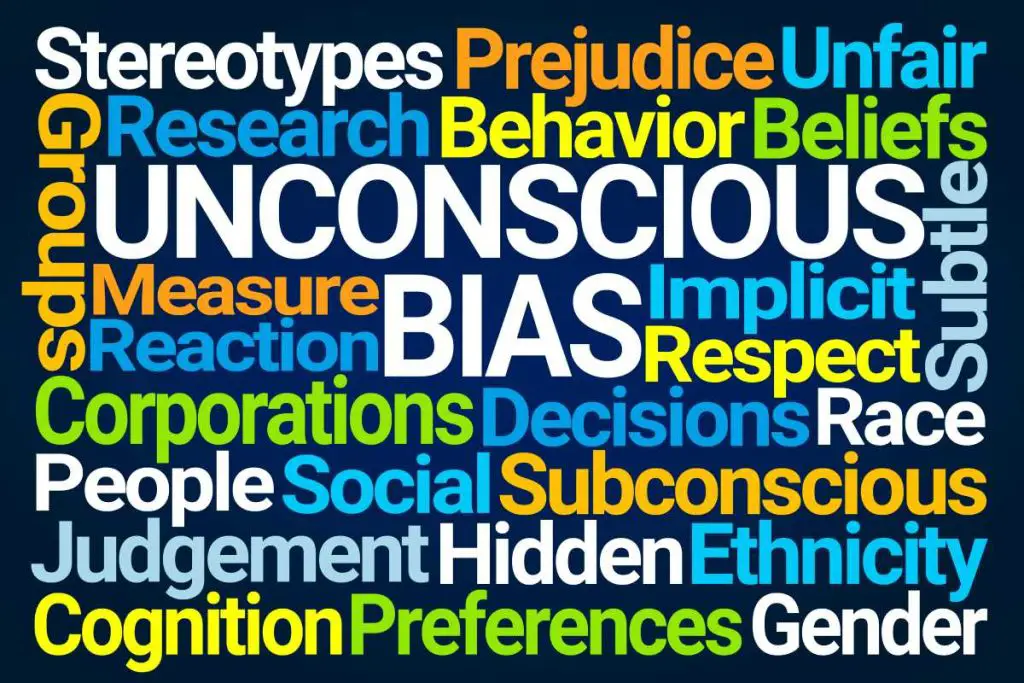
Beware of logical fallacies
Logic is taking two facts, and concluding a third fact that is true. For example: All mammals have nipples; Monkeys are mammals; Therefore, monkeys have nipples.
Logical fallacies are common errors in reasoning, and they’re often used by politicians and the media to deceive people. A logical fallacy is taking two facts, and concluding a third fact that they claim is true, but it’s a false conclusion which is not justified by the argument. For example: I see a dark cloud on the horizon; Dark clouds mean rain; Therefore, it’s going to rain here today. Just because you see a dark cloud and dark clouds mean rain does NOT mean it’s going to rain here today. That would be a false conclusion.
Ask yourself if a different conclusion can be possible. If your answer is yes, it’s probably a logical fallacy. Be vigilant for this type of logic, and always check your facts first before drawing any conclusions.
Make a plan

Set realistic goals and list the incremental steps needed to be taken to achieve them. Keep the steps small and actionable. We tend to follow through with a plan when we can see the results of our efforts quickly. There’s nothing quite as satisfying as the feeling of accomplishment you can get from seeing a plan come together.
Related post: Good things come to those who wait – the art of delayed gratification
In summary
Like any other learned skill, rational thinking takes practice, perseverance, and focus. Rational thinking enables you to think more slowly, deliberately, and carefully instead of being on autopilot, thinking quickly and without much conscious effort.
On the other hand, emotional thinking allows you to sense the emotions of others and respond appropriately. If managed effectively, it enhances our capacity for resilience, motivation, empathy, reasoning, stress management, and communication.
Balancing both our emotional thinking mind and our rational thinking mind is attainable. Learning to apply logic to emotional responses and understanding these responses can lead us to a more fulfilled and happy life.
If you’ve made it to the end of this post, it’s probably a sign that you are getting there. Keep trying. It’s worth it.

